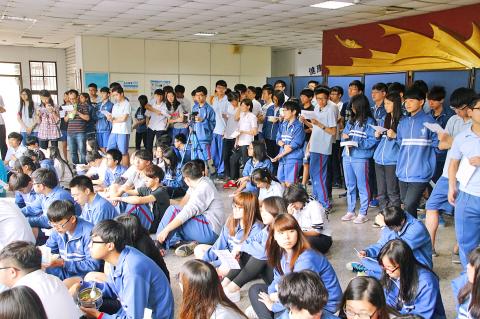A wave of high-school student protests against the Ministry of Education’s controversial adjustments to high-school curriculum guidelines has escalated, with students from at least 16 high schools campaigning in nationwide, coordinated action.
Following a sit-in organized by National Taichung First Senior High School students earlier this month, the initiative has drawn support from fellow students at National Hsinchu Senior High School, Taipei Municipal Jianguo High School and National Wuling Senior High School in Taoyuan, among others.
Opposition to the modified curriculum set to be implemented in August stems from perceived procedural flaws by the ministry, as well as changes to history textbooks that critics say reflect a “China-centric” view.

Photo provided by a student
The ministry has been “too dogmatic” in bulldozing through the curricular adjustments, students at National Chu-pei Senior High School in Hsinchu County said, adding that they hope that history teachers can be freed from political interference and join the students’ cause.
Taipei Municipal Jianguo High School student Ho Wei-tzu (何蔚慈) said that the school’s student association is set to organize larger protests nationwide in collaboration with fellow students at National Hsinchu Senior High School.
The anti-curriculum campaign aims for the revocation of the adjusted curriculum and a re-evaluation of the curriculum-reviewing mechanism, he said.
“The ministry, as the governing body [of education], is culpable by failing to maintain procedural justice [in modifying the curriculum], on which civic education has placed great emphasis. The new curriculum of civic education is thereby problematic,” he said.
Taipei Municipal Jianguo High School teacher Tseng Yi-ming (曾宜敏) said that she was pleased to see students respond to social issues, as the purpose of education is to foster students’ ability to think critically and act correspondingly.
New Taipei Municipal Zhonghe Senior High School student activist Liang Yan-jou (梁艷柔) said that students organized a forum to debate changes to the curriculum on the campus last week, attracting more than 200 students and teachers.
A series of activities organized by high-school students against the curricular adjustments include a panel discussion moderated by spokeswoman of the Black Island National Youth Front Lai Pin-yu (賴品妤) at Jianguo High School yesterday; a demonstration marching from Jhongli Station in Taoyuan tomorrow; a forum at National Tainan Girls’ Senior High School on Wednesday next week; and a panel discussion at SuSu Second-Hand Bookstore and Guesthouse chaired by education activist Chou Wei-tung (周威同) in Taitung County on Thursday next week.
Facebook communities have been established to mobilize more students to advance the campaign.
Additional reporting by Weng Yu-ming and Wang Chun-chieh

Tropical Storm Gaemi strengthened into a typhoon at 2pm yesterday, and could make landfall in Yilan County tomorrow, the Central Weather Administration (CWA) said yesterday. The agency was scheduled to issue a sea warning at 11:30pm yesterday, and could issue a land warning later today. Gaemi was moving north-northwest at 4kph, carrying maximum sustained winds near its center of up to 118.8kph and gusts of 154.8kph. The circumference is forecast to reach eastern Taiwan tomorrow morning, with the center making landfall in Yilan County later that night before departing from the north coast, CWA weather forecaster Kuan Shin-ping (官欣平) said yesterday. Uncertainty remains and

SEA WARNING LIKELY: The storm, named Gaemi, could become a moderate typhoon on Wednesday or Thursday, with the Taipei City Government preparing for flooding A tropical depression east of the Philippines developed into a tropical storm named Gaemi at 2pm yesterday, and was moving toward eastern Taiwan, the Central Weather Administration (CWA) said. Gaemi could begin to affect Taiwan proper on Tuesday, lasting until Friday, and could develop into a moderate typhoon on Wednesday or Thursday, it said. A sea warning for Gaemi could be issued as early as Tuesday morning, it added. Gaemi, the third tropical storm in the Pacific Ocean this typhoon season, is projected to begin moving northwest today, and be closest to Taiwan on Wednesday or Thursday, the agency said. Today, there would likely

DISRUPTIONS: The high-speed rail is to operate as normal, while several airlines either canceled flights or announced early departures or late arrivals Schools and offices in 15 cities and counties are to be closed today due to Typhoon Gaemi, local governments announced last night. The 15 are: Taipei, New Taipei City, Taoyuan, Tainan, Keelung, Hsinchu and Kaohsiung, as well as Yilan, Hualien, Hsinchu, Miaoli, Chiayi, Pingtung, Penghu and Lienchiang counties. People should brace for torrential rainfall brought by the storm, with its center forecast to make landfall on the east coast between tonight and tomorrow morning, the Central Weather Administration (CWA) said. The agency issued a sea warning for the typhoon at 11:30pm on Monday, followed by a land warning at 11:30am yesterday. As of

CASUALTY: A 70-year-old woman was killed by a falling tree in Kaohsiung as the premier warned all government agencies to remain on high alert for the next 24 hours Schools and offices nationwide are to be closed for a second day today as Typhoon Gaemi crosses over the nation, bringing torrential rain and whipping winds. Gaemi was forecast to make landfall late last night. From Tuesday night, its outer band brought substantial rainfall and strong winds to the nation. As of 6:15pm last night, the typhoon’s center was 20km southeast of Hualien County, Central Weather Administration (CWA) data showed. It was moving at 19kph and had a radius of 250km. As of 3pm yesterday, one woman had died, while 58 people were injured, the Central Emergency Operation Center said. The 70-year-old